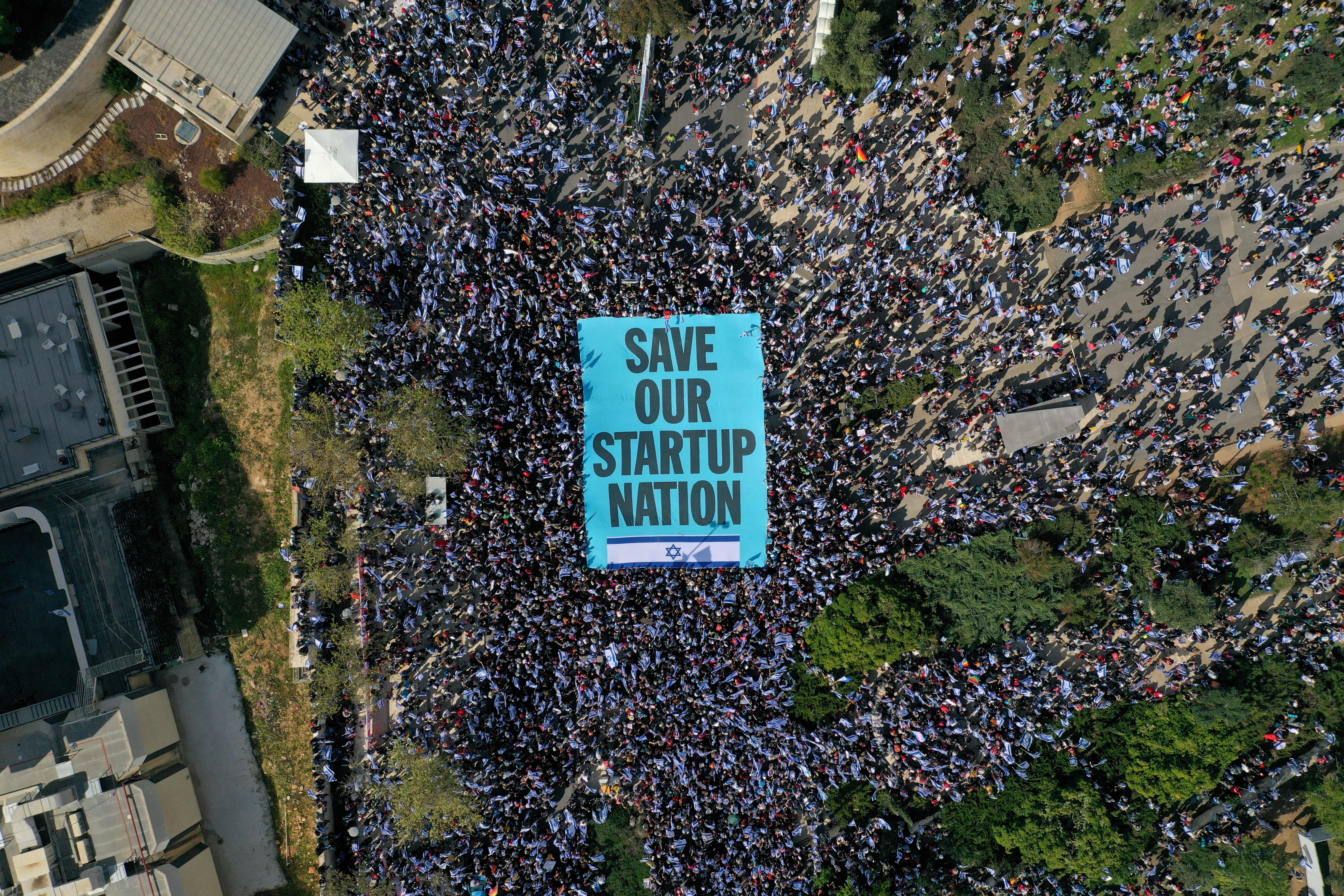
- Israel is in a period of calm after weeks of intense protests.
- On Monday, Prime Minister Benjamin Netanyahu said he would delay legislation that critics say will weaken the judiciary.
- Some CEOs are deeply concerned about what the turmoil means for companies in Israel.
Demonstrators gather outside the Israeli parliament in Jerusalem on March 27, 2023, amid calls for a general strike against the far-right government’s controversial efforts to reform the justice system.
– | Afp | Getty Images
Israel is experiencing a period of calm after weeks of intense protests by large segments of the population over a plan that would greatly weaken the country’s Supreme Court.
On Monday, Prime Minister Benjamin Netanyahu said he would delay legislation that his critics say will weaken the judiciary: It will change the way Israel’s top judges are approved; allowing the Knesset (Israel’s parliament) to overturn Supreme Court decisions by a simple majority; It would prevent the court from ruling on the many laws enacted by the legislature.
The uncertainty in the political situation in Israel extends deep into the business sector. Large Israeli companies get most of their revenues from the United States, Europe and Asia, because in terms of the global economy, Israel is a small market. Most of Israel’s neighbors have little or no trade with Israel.
This month, ratings service Fitch warned that the court controversy “may erode Israel’s credit profile.” Moody’s issued a similar statement saying that “the proposed changes could materially weaken the power of the judiciary and thus be a credit negative.” However, neither agency has changed Israel’s credit rating yet.
“I’m constantly talking to investors who want to know the risks,” said Tomer Weingarten, CEO of cyber defense firm SentinelOne. “It has become an environment in which they are not sure they are comfortable working.”
SentinelOne has 300 employees in Israel. It also has a venture capital arm that invests in the country. Weingarten says he may slow the flow of capital “for fear of what happens next”.
Some Israeli companies worry that questions about taxation, workers’ rights, investor rights and other big issues could be decided by a Supreme Court appointed by a right-wing government that does not share their beliefs.
But the CEO of Neteera Technologies, a digital health company and Jerusalem-based CNBC Disruptor, disagrees. Yitzhak Littman did not notice any impact on foreign investments, although he acknowledged that they are essential to his company and the economy of Israel.
“People are talking in the heat of the moment, lighting all over the country, and that’s led to major fires,” Littman said. His company, which is not publicly traded, recently closed a round of financing, and the struggle did not come to justice “all at once.”
Littman said he agrees that investors should always weigh the risks, but he thinks the concerns will be mitigated within six months. The current disruption is “a stress test of sorts for startups and investors,” Littman said, but “we’re resilient, our economy and workforce are strong, and we can weather this.”
While he has yet to see it, SentinelOne’s Weingarten predicted that the political climate would lead some of his employees to want to leave the country. “I will consider any request from any employee,” he said.
Weingarten’s greatest fear is the irreparable division in Israel, a country where a great degree of unity was once taken for granted.
Recent polls show that two-thirds of Israelis oppose the plan to change the judicial system.
On Monday, Netanyahu said he would allow about a month for negotiations on the proposed legislation. However, that falls in the middle of Jewish holidays and the Knesset’s spring break, followed by Israel’s Day of Remembrance and Independence Day, which will be Israel’s 75th.y.
All of these times are traditionally times of loneliness, but according to David Makovsky of the Washington Institute, a think tank focused on the Middle East, “preventing a major move on a deal seems unlikely.”
“For things to improve, Netanyahu’s poll numbers would have to be on the decline,” said one analyst.
Ronen Zvulun | Reuters
The economy took a serious hit from the political struggle. The shekel has recovered from its lows but has fallen 10% against the dollar in recent weeks. The Tel Aviv Stock Exchange is down 20% so far this year.
It’s all about the prime minister’s political survival, Makovsky told CNBC.
“For things to get better,” he said, “Netanyahu’s poll numbers would have to be on the decline.” Such a backtracking would cause the prime minister to push his right-wing coalition partners into a deal more in line with the country’s citizens in general.
Women dressed as servants from the movie “The Handmaid’s Tale” take part in a demonstration after Israeli Prime Minister Benjamin Netanyahu sacked his defense minister and his national coalition government pursues judicial reform, in Jerusalem on March 27, 2023.
Ammar Awad | Reuters
There are signs starting to happen. An opinion poll published on Monday showed that if elections were held today, Netanyahu’s Likud party would lose seats and would not be able to form a right-wing coalition like the one that exists now.
“If Netanyahu really wants to save the day, he may have to tell his partners on the right, ‘You are leading us to hell,’” Makovsky said. “If you want to stay in power, you have to be where the country is.”
However, it is unclear whether the right-wing coalition members will agree to changes in their plan for the judiciary. If they don’t come forward, it could lead to the demise of this government and new elections – the sixth in Israel in four years.




More Stories
Journalists convicted in Hong Kong sedition case
Stand News: Hong Kong journalists convicted of sedition in case critics say highlights erosion of press freedom
Shark decapitates teen off Jamaica coast